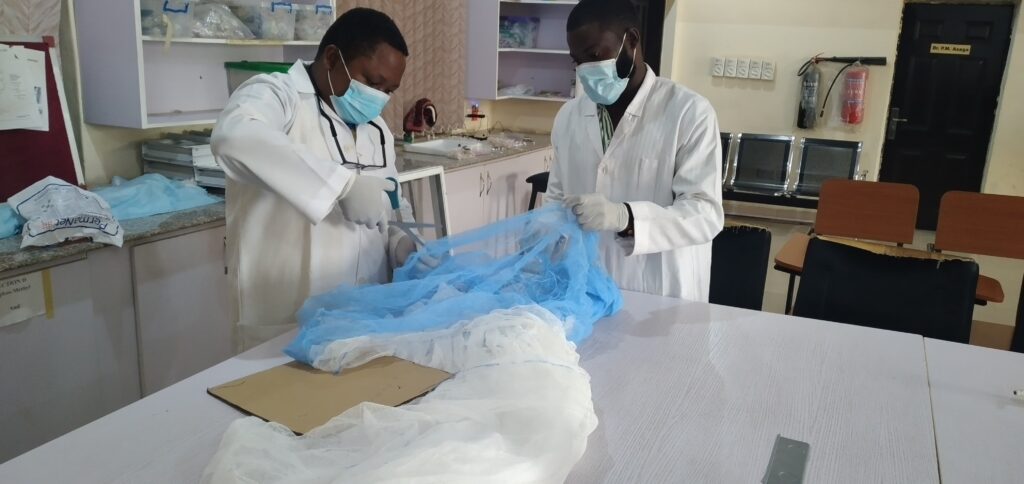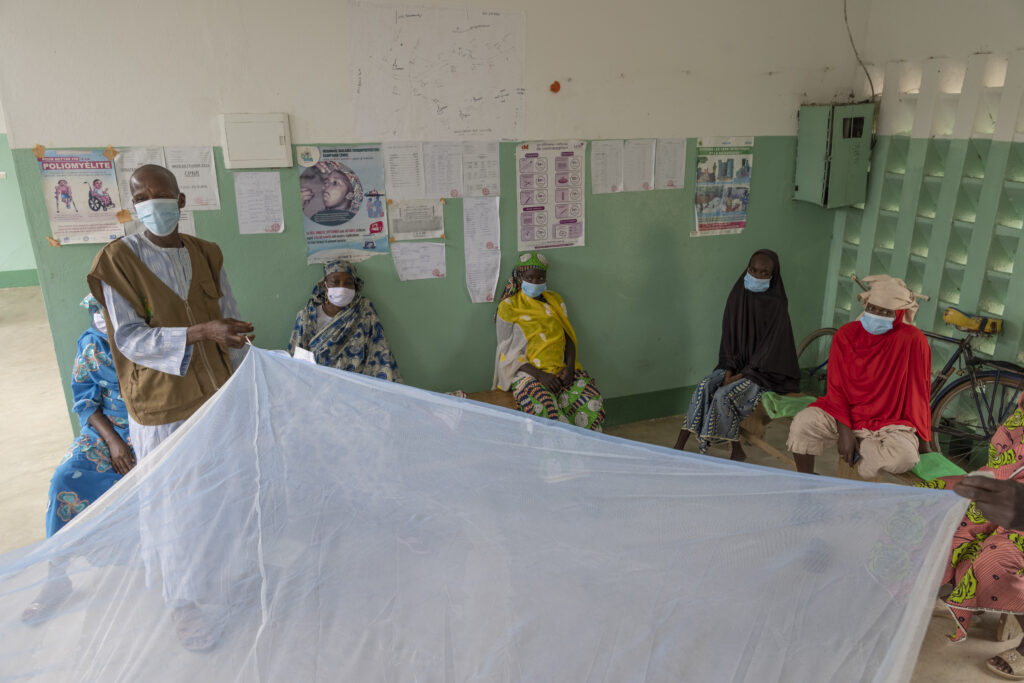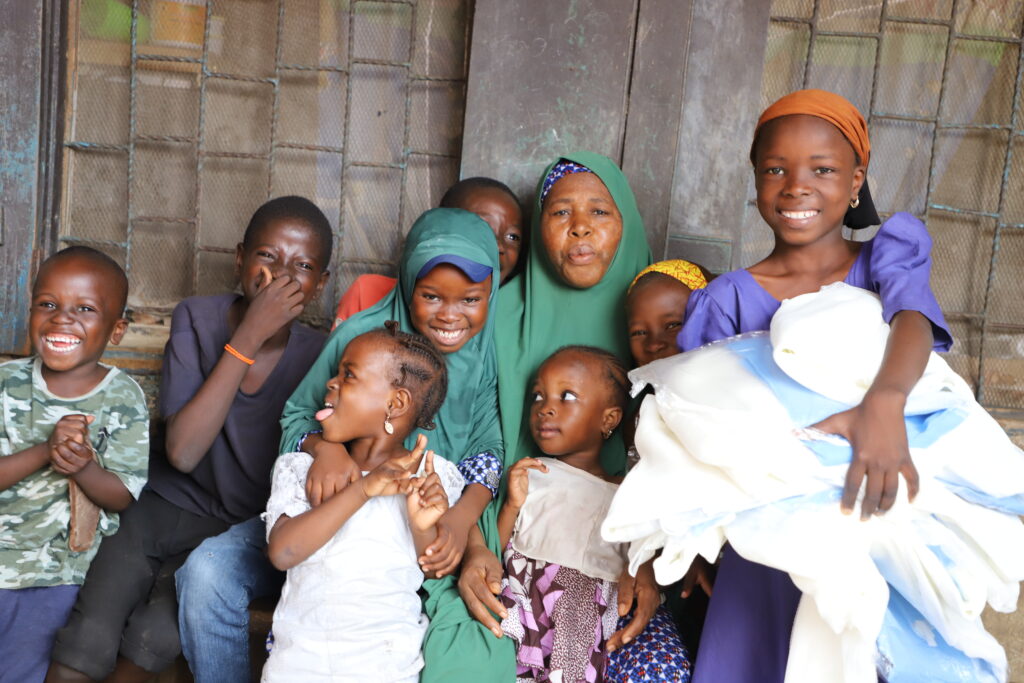One of the most effective ways a family can protect themselves from malaria-carrying mosquitoes is to sleep under a net.
Mosquito nets are made with insecticide, a type of chemical that is deadly for mosquitoes while safe for people, thus protecting sleepers by: 1) preventing physical contact with mosquitoes, 2) repelling mosquitoes, and 3) killing mosquitoes that land on the net.
Each year the U.S. President’s Malaria Initiative donates and distributes millions of these lifesaving nets to families in sub-Saharan Africa and the Greater Mekong Subregion in Asia. A critical partner in this work is the Global Fund to Fight AIDS, Tuberculosis and Malaria.
In fiscal year 2021, PMI collaborated with the Global Fund and others to support net campaigns in 15 countries to deliver 109 million nets.
In many countries, PMI supports the continuous distribution of insecticide-treated nets through prenatal visits for mothers and vaccination visits for children while the Global Fund supports mass distribution campaigns.
In some countries, such as Nigeria and the Democratic Republic of Congo, both organizations support net distribution in different parts of the country. Therefore, it is important for partners to share data on mosquito behaviors and how nets are holding up to ensure coordination and harmonization on net types and the timing of distributions, especially in countries that are tailoring the types of nets they are distributing at a sub-national level.

Technicians in Nigeria preparing to test the effectiveness of a dual-AI net. Photo by PMI VectorLink.
New challenges require new solutions
One of the greatest threats to malaria control efforts is the emergence of insecticide resistance in mosquitoes, which has been detected in all 27 PMI partner countries.
Dual Active Ingredient (dual-AI) mixtures, or one insecticide plus another chemical. A recent study from Tanzania found that these new nets reduced malaria cases in children under 5 by almost half. One type of dual-AI net uses two insecticides so that in the event that the mosquito survives contact with the first insecticide it is likely to be killed by contact with the second. Another kind of dual-AI nets’ second ingredient reduces the mosquito population by inhibiting the surviving mosquitoes’ ability to lay eggs, larva to transform into pupa, and pupa into adult mosquitoes.
To finance work around dual-AI nets, PMI is a supporting partner of the Innovative Vector Control Consortium’s (IVCC) New Nets Project (NNP), which is co-funded by the Global Fund and UNITAID. IVCC is a not-for-profit, product development partnership designed to facilitate the development and delivery of new and improved tools to prevent malaria and other diseases.
Dual-AI nets don’t yet have a World Health Organization (WHO) policy recommendation saying that countries with resistance to pyrethroid insecticides should consider them over standard nets. This means some countries are waiting for that official recommendation before buying those nets. Therefore NNP is generating the necessary data to support an eagerly anticipated WHO policy recommendation for dual-AI nets to control disease-carrying mosquitoes while expanding the market for these state-of-the-art tools.
NNP’s progress has created a favorable foundation for the Global Fund’s $50 million Net Transition Initiative, which will support targeted deployment of dual-AI nets where potential impact is greatest; generate evidence to inform prioritization decision-making between effective vector control tools; and prime for scale-up when the WHO policy recommendation on dual-AI nets does come.

Healthcare workers in Cameroon learn how to teach families how to hang PMI-donated nets. Photo by PMI Impact Malaria.
Reducing prices and expanding the market
With support from PMI and the Global Fund, NNP also assesses the cost-effectiveness of the nets across countries representing different epidemiological, insecticide resistance and entomological profiles. These pilots help us to understand the extra benefit these nets can bring in different settings, thus allowing countries to make informed decisions about how best to spend their malaria control budgets.
The pilots started in 2019 with Burkina Faso and Rwanda and new countries were added the following year. To date, more than 36.6 million dual-AI nets have been ordered or delivered with support from NNP across 21 countries, most of them PMI partners in sub-Saharan Africa.
The large number of nets purchased by PMI and the Global Fund for the pilots provided such a strong signal to suppliers of the near-term immediate volume demands that, when coupled with complementary negotiations by MedAccess and the Bill and Melinda Gates Foundation, resulted in earlier than expected unit price reductions of $2 per net less than the original price set by their manufacturers.
The lower price is needed to make the dual-AI nets a sustainable choice for countries looking for the best value for money in controlling malaria. Affordable pricing has not only expanded access to dual-AI nets in partner NNP countries but it has enabled four more countries not participating in the pilot to be able to purchase them as well.
Working closely with the Global Fund, PMI will continue to expand access to affordable, dual-AI nets so that countries are better able to effectively combat mosquitoes that spread malaria.

A family in Nigeria with their new nets from PMI. Photo by USAID Global Health Supply Chain Program – Procurement and Supply Management.
Cover photo: A mother and one of her three children under a net in Sierra Leone. Photo by Mwangi Kirubi, PMI Impact Malaria.
